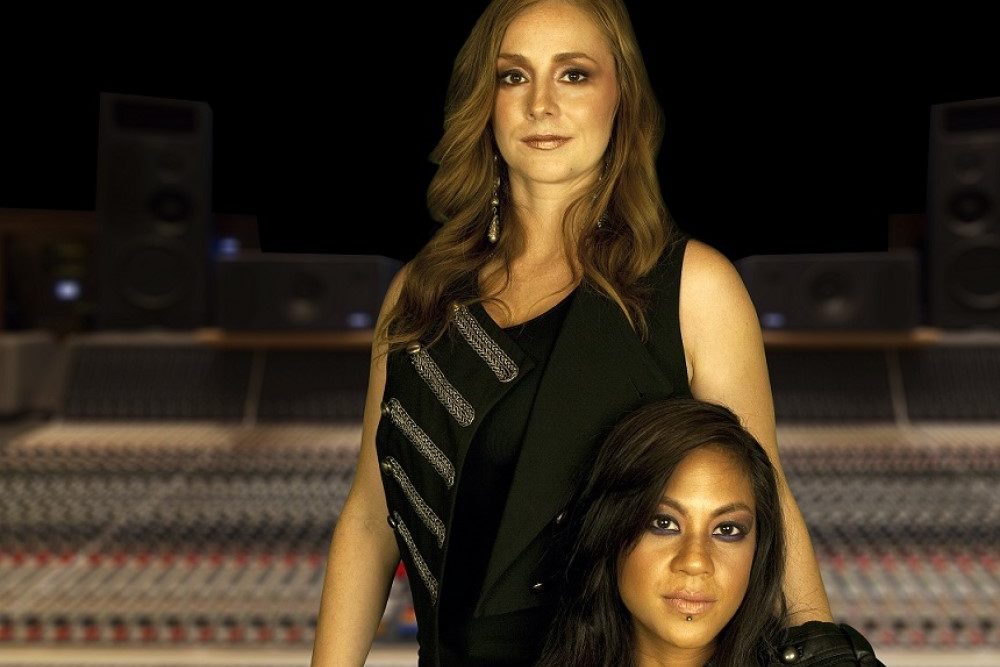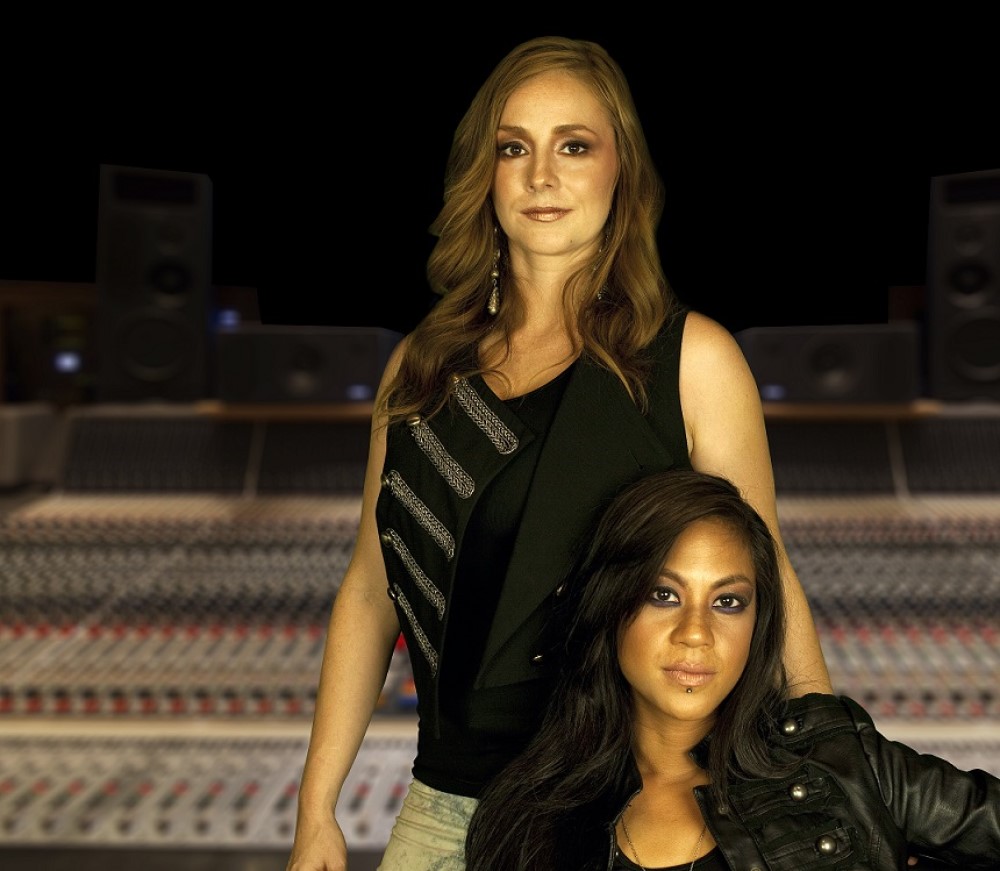After a Decade in the Club, Dance Loud Celebrate Debut LP “The Moment”


Dance Loud’s The Moment has been more than ten years in the making. It’s what happens when an electronic duo whose career has been as energetic and careening as their namesake, has to pause — literally. Chicago-based artists Kristin Sanchez and Desereé Fawn Zimmerman were touring in 2017 when a semi rear ended their vehicle, landing the onstage collaborators and offstage couple in a month-long hospital stay. They’d spent a decade activating dance floors across the country with house beats layered with live music. But if life ended tomorrow, what would they leave behind? As they recovered, releasing an LP became their top priority.
On a phone call with Sanchez and Zimmerman, the women effuse positivity and laughter. It’s an interesting contrast to The Moment, which simmers with a melancholy optimism. The tracks feel meditative: field recordings of cyclical sounds like crickets, electronic drum rhythms that pump like heart beats, existential questions such as “are we as one?” repeated and stretched with echoes. Each song forces a range of emotions — anger and disappointment as much as excitement and longing — making The Moment a potent debut from two rising dance musicians.
Sanchez has been a house DJ since she was 18, and Zimmerman is a classically trained musician. They’re both multi-instrumentalists with audio degrees. Here’s what the pair had to say about the life and love that went into The Moment.
AF: There’s a lot of optimism and hope in how you talk and market yourselves, which seems at odds with the album’s darker qualities. Do you feel pressure to put a positive face forward? And if so, where does that come from?
KS: One thing we’ve learned [over time] is that you just have to figure out a way to be up. You have to program your brain to stop always thinking someone’s lying to you. You can’t be angry or hate all the time.
DZ: It doesn’t matter how good of a person you are. In someone’s story, you’ll eventually be the villain. I’m coming to terms with that. There’s always a reason people do the things they do and still sleep at night. Some of our brains get wired a certain way because of the culture we live in, but it doesn’t make them “bad.”
KS: For example, my mom grew up in a culture — she’s very homophobic. That’s really difficult for me, but I can’t hate my mom.
AF: I admire that you can put your mom’s attitude into context, but how do you find the energy for patience and compassion towards her? That seems like a heavy burden.
KS: I always say it took my mom about eight years to stop crying about me not being her dream child. She’s still slightly in denial [about my sexuality], but I was born in 1984. In high school, I would sneak out and hit the gay club scene [in Chicago]. I would do this nightly because I just had to escape. I stopped going to school. I’d only come home during the day because that’s when my parents weren’t there. We were in a cold war.
They took my car battery, so I went to the South Side and got my own battery. They’d hide my car, and I’d go rollerblading to find it. Then they put a club on my steering wheel. I tried to drive it with the club on while my parents chased me down the street. They were like, “Are you on drugs? Are you in trouble with the law?” But I knew my mom knew. She knew. She just wouldn’t say it. And finally I was like, “Mom, I’m GAY!” Once I said that, they took off the club and just let me go.
DZ: I’m from a small town, and I had to move to Chicago because I knew that I wasn’t going to be able to be myself in this town. I was going to be outcast and treated poorly if I had come out of the closet there. When I was finally in a relationship and I told my mom, she was like, “Oh, just don’t tell anyone.” I don’t think she understood that that’s much more hurtful. There were points when I wanted commit suicide because I knew I couldn’t change it. I thought, I have to learn to love myself or I’m going to commit suicide.
We’ve both come to terms with our parents. I think deep down, our parents still wish we were straight, but now I’m to the point where I’m like, I love myself, and I believe I’m a good person. If you think me being gay makes me a bad person, that’s a burden you’re carrying. I’m not.
AF: That’s a great attitude. It seems like you’re both spiritual people, and that really comes through on the record. Can you expand on where that comes from?
DZ: Well, my mom’s side was Pentecostal, my dad’s side was Mormon. I got in trouble in high school and got sent to Baptist private school. I’ve had a fair share of religion and realized it wasn’t for me. But I’m very spiritual person. I believe in balancing with the earth and not taking more than you need, so I think that that’s an underlying tone [to our music].
There’s a quote by [Nikola] Tesla: “If you wish to understand the Universe, think of energy, frequency and vibration.” Just being in audio, we have a really good understanding of how deep this rock can really be. There are octaves unknown. You can’t [hear them] with our human bodies. Imagine this whole universe has so many more octaves we have to learn about.
KS: A good example of this is sympathetic frequencies. Take two tuning forks that are tuned to the same number. If you strike one tuning fork, the second fork will start to resonate. But if you tune the forks slightly differently, you start to create a beat and a wobble. I think as humans, when we find people on our frequency range, we start to resonate from each other. We’re vibrational creatures, and even our thoughts carry frequency. People who are sensitive to frequency are empaths. You know, they just feel the vibrations of someone else.
DZ: Growing up, my parents were metalheads. I got really into jazz on my own, and I loved gospel drummers, but I realized that I just really loved high tempo [music]. It was more fun. And when I was introduced to electronic and house music — oh, wow! There’s a quote [by Eddie Amador]: “Not everyone understands house music. It’s a spiritual thing, a body thing, a soul thing.”
AF: In what ways does being a couple help your music? And how do your disparate musical backgrounds complement one another?
KS: We have, like, silent designated duties. Living together, working together, doing everything together — we just know what one another is really good at. Desereé’s really funny, and she’s really good with tone. She’s got years of playing the guitar, and she’s great at trying new techniques. I’m really into drum machines and synthesizers and anything electrical happening with the sound. I usually take care of a lot of the production processing.
DZ: I think, if Kristin created music on her own — she’s very happy-go-lucky person. I think her music would come out very happy. And I feel the world. I have a lot of feeling. I’m a Cancer, she’s a Gemini.
KS: But I have a secret sad side no one knows about! [laughs] I kept trying to add cello to the record.
DZ: There’s definitely an underlying tone of emotion Kristin adds.
KS: But I grew up with almost no music in my life. All we had was a karaoke machine. I had a Michael Jackson CD and a Toni Braxton CD, and that was it. I got exposed to pop music later, but I didn’t try an instrument until I was older.
DZ: When I got sent to that Southern Baptist High School for being a troubled kid — like, not accepting myself and not caring if I lived or died — you couldn’t listen to music there. That was really hard for me. I went there with a guitar, and my art teacher — she was so sweet. She let me transcribe literally hundreds and hundreds of hundreds of pages of tablature so I could play the music I wanted to hear. And I realized that there was a very specific feeling to a lot of music [I was] playing. Just very melodic music with tones that make you feel. Kristin loved pop music growing up, but I wasn’t a big fan of pop music. So I kind of feel like you never fully stray from your roots, and we combine really different things in the studio. It hurts us a little because Spotify doesn’t know how to categorize us. We’re not just one genre. But I always think about it like Thelonious Monk. He put his foot down and said, “No, I’m not going to play the jazz you want me to play! In time, the world will catch up!” And it did.
Follow Dance Loud on Facebook for ongoing updates.

